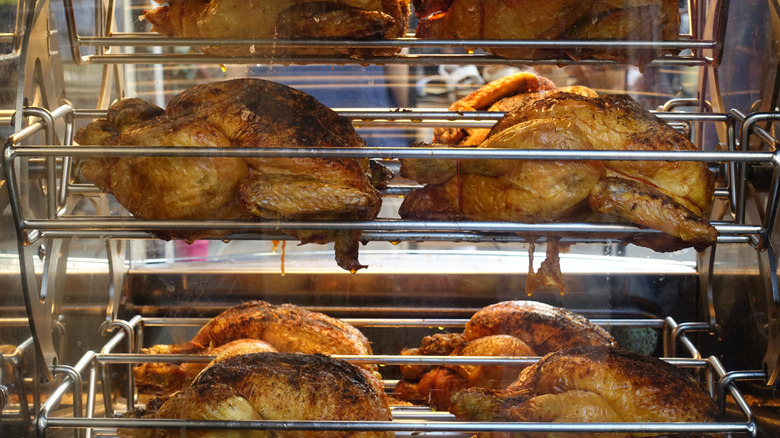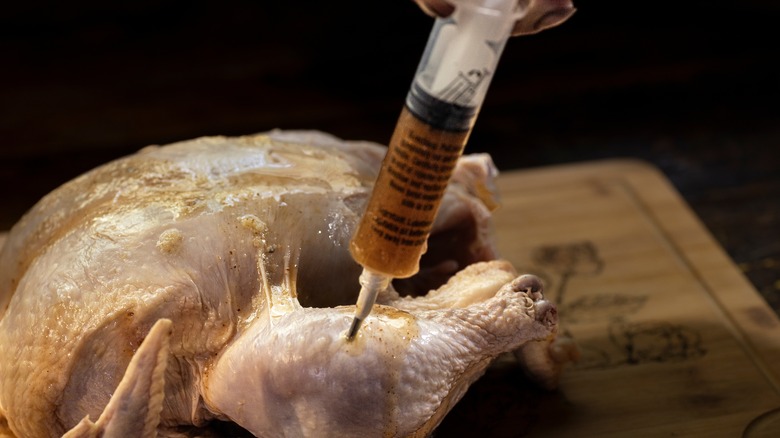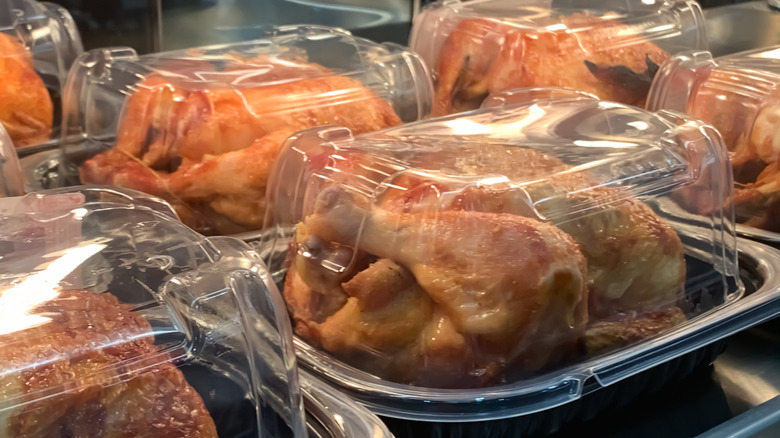The Unsettling Reason Rotisserie Chicken Is So Cheap
Roasting a chicken at home can be time-consuming, and patiently waiting to dig in as your home fills with an irresistible aroma can be downright torturous. Ready-to-go rotisserie chickens from the store are an easy and tasty way to skirt this issue when you're pressed for time. Add in the lower price point, and popping by the market for a roasted bird is pretty enticing. But why is a pre-made rotisserie chicken cheaper than a raw one? When you think about it, the work of cooking, packaging, and keeping it warm should raise the price, like it does at a restaurant.
It turns out that there's a good reason why rotisserie chickens are such a bargain, and you're probably not going to like it: The birds usually start out as raw ones that are closing in on their expiration dates, but haven't sold yet. This isn't a chicken-only practice for grocery stores. Many ingredients that on their last leg may be taken off shelves and repurposed into prepared foods.
You might use similar methods to use up ingredients at home, but the way that supermarkets cook their nearly-expired food is out of your hands, which can feel a bit unnerving. The good news is that the safety of rotisserie chickens isn't something to worry about, as long as you properly store and handle them. However, clever repurposing isn't the only secret these birds are keeping.
Other sneaky secrets about rotisserie chicken
There's a reason why your store-bought rotisserie chicken tastes so good, beyond the simple appeal of crisp skin and tender meat. The birds are often injected with a liquid solution to keep them moist and flavorful. A hodgepodge of ingredients come together to enhance the meat's flavor, texture, and extend the chicken's shelf life. Common players include sodium, sugar, MSG, preservatives, artificial flavors, and fillers or binders to help the bird keep its shape.
While this is a very common practice, it may raise concerns if you're looking to avoid certain ingredients. The simple way to know which rotisserie chickens to buy or avoid is to check the ingredient list on the label. Many chain stores display all of the ingredients included in their rotisserie chicken on the package. If you're at a smaller store, you can simply ask the staff about what's in the birds.
If you feel like taking a break from store-bought chickens, given all of this secret-keeping, you can always try making a DIY rotisserie chicken on your grill. And if you're upset about feeling so suspicious of your favorite grab-and-go staple, you should know that you don't have to give it up. Handle your rotisserie bird properly, and it won't harm you or make you sick.
How to ensure safety with store-bought rotisserie chicken
Just because rotisserie chicken is made from older products doesn't mean it's unsafe to eat, or will spoil right away. The U.S. Department of Agriculture (USDA) says you have three to four days to consume cooked chicken, as long as you keep it properly refrigerated at 40 degrees Fahrenheit or below. Don't leave it sitting out of the fridge for more than two hours, or it could warm up enough for bacteria to grow rapidly.
With that being said, if you're concerned about freshness, try asking your local store's staff how often their rotisserie chickens are restocked (or if you're at Costco, listen for a bell chime that will tell you a fresh batch was just put out). And when you cut into your bird, don't despair if the meat looks pinkish. According to the USDA, this color can result from a simple chemical reaction during the cooking process, or even from chemicals in the chicken feed.
If you don't finish the chicken in one sitting, transfer it to containers with airtight lids. The USDA recommends cutting hot rotisserie chicken into parts and transferring it to shallow containers, so the meat cools faster and reaches a safe temperature quicker. You can turn leftovers into tasty recipes like chicken salad-stuffed avocados or chicken tortilla soup. If you're chickened out before four days are up, freeze prepared rotisserie chicken for up to four months.



